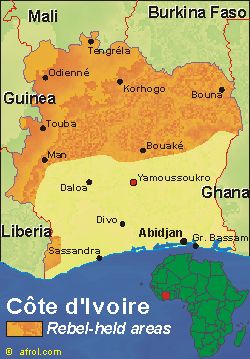|
afrol News, 28 January - Relations between the governments of Burkina Faso and Côte d'Ivoire are getting as hateful as between Ivorians and Burkinabe in the streets of Abidjan. Burkinabe President Blaise Compaoré accuses Ivorian President Laurent Gbagbo of racism, while Côte d'Ivoire accuses Burkina Faso of being a "rough state". The diplomatic row between the two West African countries escalated this week, as Burkinabe President Compaoré likened Ivorian President Gbagbo to ex-Yugoslav war criminal Slobodan Milosevic and an angry Ivorian crown yesterday set fire on the Burkinabe embassy in Abidjan. The two neighbours had complicated relations already before the five months of civil war in Côte d'Ivoire that started in September. Ivorian President Gbagbo had barred the main opposition leader, Alassane Ouattara, from standing in elections, alleging he was a Burkinabe citizen. Also residents that were suspected to belong to the large Burkinabe and Malian immigrant groups were rejected a chance to vote. During 2002, the mainly Christian citizens of the Ivorian economic capital Abidjan turned increasingly hostile towards Muslim northerners and Burkinabe and Malian immigrants - claiming these foreigners were attached to the political opposition. Soon after the outbreak of the September 2002 mutiny - which soon saw most of northern Côte d'Ivoire conquered by rebels - President Gbagbo put the blame on Burkina Faso for the turmoil. The Ivorian government named Burkina Faso a "rough state" over its alleged involvement in the mutiny. The Burkinabe government denied any involvement.
Burkinabe immigrants - some say, there were 4 million in Côte d'Ivoire - soon became the target of Ivorian southerners wanted to revenge the Ivorian army's poor performance in the battlefield. In a wave of xenophobia, northerners, immigrants and refugees were targeted by Abidjan police and citizens. Several Abidjan shanty towns dominated by foreigners were burnt down by the police. Last week, Burkinabe President had had his part of allegations from Abidjan and continuous media reports in the local press about xenophobic attacks on his citizens. Mr Compaoré told the French daily 'Le Parisien' that the Ivorian civil war could only end if elections were scheduled to "replace" President Gbagbo. The Ivorian President should step down or risk being brought before a war crimes tribunal, his Burkinabe counterpart told 'Le Parisien'. President "Gbagbo will end up like Milosevic, before the international criminal court where he will have to explain mass graves and acts of violence committed by his supporters as well as death squads in his country," President Compaoré said. Before leaving Ouagadougou on Friday for the Paris summit that reached an Ivorian peace agreement, President Compaoré said his country was to bring several suits before international courts for crimes committed against Burkinabe citizens during the war in Côte d'Ivoire. "Burkina Faso did not invent the conventions or international laws which state that when men kill others who are from different ethnic or religious groups on a large scale, they are liable to be judged by international courts," he said. The Ivorian government was less than impressed by the statements made by President Compaoré and maintained that Burkina Faso was playing an important role in the civil war, supporting the rebels.
Shortly after signing the Paris peace agreement, rioting Abidjan citizens again fuelled the conflict between the two neighbours. The peace deal, which dissolves the Ivorian government and gives key ministries to the northern rebels. The new Prime Minister, Seydou Diarra, also is from the Muslim north. Northerners celebrated they had "won the war". In Abidjan, the peace deal led to protest marches, with pro-Gbagbo mobs accusing France and Burkina Faso of imposing the deal on their country. Protesters yesterday set fire to the Burkinabe embassy, put up barricades on some main roads and set fire to the fence around the French embassy. Attacks on Burkinabe citizens and their property seemed likely to continue for the next days. Côte d'Ivoire and Burkina Faso however depend on one another economically and therefore will have to find solutions to their problems on a longer term. Cocoa production, the biggest Ivorian export commodity, is labour intensive and depends heavily on migrant workers from the country's northern neighbours. Landlocked and poor Burkina Faso, on the other hand, depends on Abidjan as its closest harbour and on the cash earned by its migrant workers on Ivorian plantations.
|
front page
| news
| countries
| archive
| currencies
| news alerts login
| about afrol News
| contact
| advertise
| español
©
afrol News.
Reproducing or buying afrol News' articles.
You can contact us at mail@afrol.com



